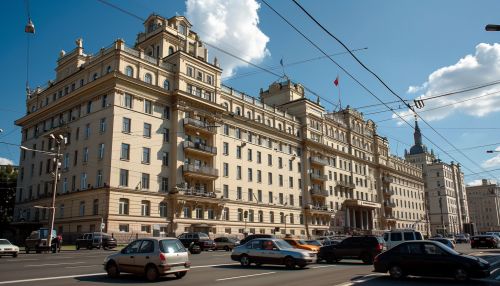Gosplan
Overview
The State Planning Committee, commonly known as Gosplan, was a state institution within the Soviet Union that was responsible for central economic planning. Established in 1921 and remaining in operation until the dissolution of the Soviet Union in 1991, Gosplan had the task of formulating and implementing national economic plans, a key component of the Soviet-style command economy.


Formation and Early Years
Gosplan was formed by a decree of the Council of Labor and Defense on February 22, 1921. Its creation was part of the Soviet government's shift towards a planned economy following the end of the Russian Civil War. Initially, Gosplan's role was to coordinate economic activity across the Soviet Union, but its responsibilities and influence grew over time, particularly under the leadership of Joseph Stalin.
Role and Function
Gosplan's primary function was to develop the Five-Year Plans that guided Soviet economic policy. These plans set production targets for different sectors of the economy, such as agriculture, industry, and services. Gosplan also had the responsibility of allocating resources to meet these targets. This included determining the distribution of labor, materials, and capital across the Soviet Union.
Structure and Organization
Gosplan was organized into several departments, each responsible for a specific sector of the economy. These departments worked together to formulate the Five-Year Plans and monitor their implementation. At the head of Gosplan was a chairman, who was a member of the Soviet government's Council of Ministers. The chairman was assisted by several deputy chairmen and a large staff of economists, statisticians, and other specialists.
Influence and Impact
As the agency responsible for economic planning, Gosplan had a significant impact on the Soviet economy. Its decisions influenced the direction of economic development, the allocation of resources, and the standard of living in the Soviet Union. However, Gosplan's effectiveness and the success of its plans have been subjects of debate among economists and historians. Some argue that Gosplan's centralized planning approach allowed for rapid industrialization and economic growth, particularly during the 1930s and 1940s. Others contend that Gosplan's plans were often unrealistic, leading to inefficiencies, waste, and economic stagnation, especially in the later years of the Soviet Union.
Dissolution and Legacy
With the dissolution of the Soviet Union in 1991, Gosplan was disbanded. Its functions were taken over by various agencies in the newly independent states. Despite its dissolution, Gosplan's legacy continues to influence economic thinking and policy. The concept of central planning, as practiced by Gosplan, remains a topic of study in economics, and the successes and failures of Gosplan's plans continue to inform debates about economic policy and development.
